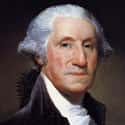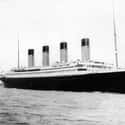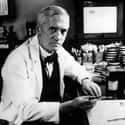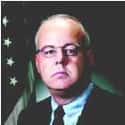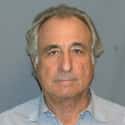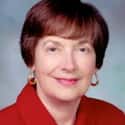-
(#1) George Seiber, Who Called The Palestinian Terrorist Plot
George Seiber predicted the Palestinian terrorist plot that was carried out at the 1972 Olympics in Munich, Germany. Seiber was an established police psychologist who was hired by Olympics organizers to predict what could go wrong at the Munich games in order to give the organizers an idea of how they should beef up security.
Seiber produced 26 predictions. The 21st was the one that would come true. This prediction envisioned 12 Palestinians breaking into the building where the Israeli athletes and coaches were staying, killing one or two people and taking the rest hostage. He said the Palestinians would make two demands: that prisoners be released from Israeli jails and that they be given a plane to fly back to the Middle East.
As it turned out, this is pretty much exactly what happened. The only discrepancy is that there were eight terrorists, not 12. They were able to break into the building pretty easily because security was so lax - the Olympic organizers had ignored Sieber's warning. The authorities tried to rescue the Israeli hostages, but they all died during the rescue operation.
Given how scarily accurate Seiber's prediction was, you have to wonder whether someone told him about the attack ahead of time. That's a question left to the ages.
-
(#2) Roger Boisjoly
- Dec. at 73 (1938-2012)
Roger Boisjoly knew that the Challenger space shuttle might fail catastrophically and tried to stop its launch, but NASA refused to acknowledge his objections. Boisjoly was a rocket engineer who worked for a company that NASA contracted with. Boisjoly noticed that the Challenger's booster rockets had a major design flaw: their elastic seals had a tendency to stiffen and unseal in cold weather.
The Challenger was scheduled for a winter launch, and Boisjoly knew that the temperatures would be too low for the booster rocket seals to handle, even in Florida. Boisjoly convinced his colleagues at his engineering company to formally recommend NASA delay the launch. However, NASA ignored that recommendation.
Sure enough, the seals failed, leading to the explosion of the entire shuttle less than two minutes after it launched.
-
(#3) Charles Colchester, The Man Who Told Lincoln To Watch His Back
Charles Colchester was a British clairvoyant who warned Abraham Lincoln that his life was in danger just weeks before his assassination.
However, Colchester was a shady character. It's unclear whether he was an actual clairvoyant, or if he just had inside information because he was actually friends with John Wilkes Booth. Colchester became close with Mary Todd Lincoln after "communicating" with her deceased 11-year-old son. But he later tried to blackmail the First Lady.
In any case, Colchester did get one thing right. He warned President Lincoln that his life may be in jeopardy. But Lincoln was skeptical of Colchester's "abilities" and didn't heed the warning.
-
(#4) George Washington
- Dec. at 67 (1732-1799)
George Washington was an incredibly intelligent leader, and most of the time, when he spoke, people listened. But the one piece of Washington's advice that everyone decided to ignore was his warning about political parties.
To really demonstrate this commitment, Washington remained nonpartisan throughout his entire presidency. In his farewell address, Washington said the following of partisan politics:
"It serves always to distract the public councils and enfeeble the public administration. It agitates the community with ill-founded jealousies and false alarms, kindles the animosity of one part against another, foments occasionally riot and insurrection. It opens the door to foreign influence and corruption, which finds a facilitated access to the government itself through the channels of party passions. Thus the policy and the will of one country are subjected to the policy and will of another."
Any of this sound familiar?
Essentially, Washington worried that political parties would become too powerful, rob the people of their control over their own government, and distract everyone from what they should really be focusing on. It's been 250 since his presidency, and maybe people are finally starting to listen.
-
(#5) The Crew Of The Mesaba, Who Radioed The Titanic About Icebergs
The Mesaba was a ship that attempted to warn the Titanic's crew about icebergs in the area. The Mesaba sailed through the same waters that the Titanic was heading for several hours before the fateful iceberg collision and sent out a warning about icebergs to every ship in the area, including the Titanic.
The crew of the Titanic did receive the message, but the radio operator who received it didn't think it was important enough to deliver to the captain. This was probably because the Titanic's radios had broken, and all the operators were overwhelmed with transcribing messages and hand-delivering them to individual passengers. One would think that a message about an unusually high number of icebergs would have gone into the "high priority" pile, but, of course hindsight's always 20/20.
-
(#6) Alexander Fleming
- Dec. at 73 (1881-1955)
The man who discovered penicillin, the world's first antibiotic, also predicted that bacteria could become immune to antibiotics. After receiving the Nobel Prize for Medicine, Alexander Fleming gave a lecture in which he warned that microbes can become "resistant" to antibiotics if they were exposed to "non-lethal quantities of the drug."
Granted, Fleming didn't specifically predict the outbreak of super bugs like MRSA, which are resistant to nearly all antibiotics, but you would think his colleagues and successors would have listened more closely to his warnings about antibiotic resistance. Just one year after Fleming gave this speech, the first strain of penicillin-resistant bacteria appeared in London.
-
(#7) Robert Heinlein, Whose Stories Predicted The Cold War
Robert Heinlein was a science fiction author who predicted the nuclear arms race of the Cold War.
In 1941, two years before President Roosevelt authorized the Manhattan Project, Heinlein wrote a short story called "Solution Unsatisfactory," which described the United States's race to build a nuclear weapon. The story foretold the danger of a world with nukes, in which anxiety builds, nations engage in the arms race, and the possibility of mutual destruction always looms.
It's unclear whether Heinlein was specifically trying to issue a warning with his work of science fiction, or whether he just wanted to explore ideas. Either way, his story turned out to be scarily accurate.
-
(#8) David Bernays And Charles Sawyer, Who Were Exiled For Trying To Save A Town
David Bernays and Charles Sawyer tried to save the residents of Yungay, Peru from the huge avalanche that completely destroyed the town in 1970.
Bernays and Sawyer were American scientists exploring the region in 1962. They were climbing the nearby mountain, Mt. Huascaran, when they noticed a lot of loose bedrock under a glacier. The two scientists knew this region was prone to earthquakes, so they tried to warn the town that a deadly avalanche could be on its way.
The government was so outraged by Bernays's and Sawyer's warning that they ordered the scientists to take it back or go to prison. The two scientists fled the country and were proven right several years later, when an avalanche killed most of Yungay's 20,000 residents.
-
(#9) Cofer Black
- 73
Ever since 9/11, more and more evidence has come out that President Bush and other major members of his administration were forewarned about the possibility of a terrorist attack but took no steps to prevent one. Cofer Black was the chief of the CIA's counter-terrorism unit back in 2001 - he was the main man who issued a strong and serious warning to the president.
On July 10, 2001, Black and his colleagues at the CIA had a meeting with Condoleezza Rice. They warned her that "significant terrorist attacks" would occur in the US in the a matter of months or weeks.
Inexplicably, nothing happened. The July meeting between Black and Rice was completely left out of the 9/11 Commission's official report, as if they wanted to pretend it had never happened at all...
-
(#10) Harry Markopolos
- 66
Harry Markopolos exposed the Bernie Madoff ponzi scheme years before it blew wide open. Markopolos worked as a financial analyst for an investment company in competition with Madoff's. In his quest to figure out what Madoff's strategy was, he realized that Madoff had to be ripping people off.
Markopolos, who describes himself as a math geek, uncovered the scheme simply by crunching the numbers and realizing that Madoff's returns were mathematically impossible. Markopolos took his findings to the SEC in 2001 and contacted several journalists. But nobody took him seriously, and he had to go on living "in fear of his life."
Markopolos thinks the folks at the SEC dismissed him because none of them had expertise in finance, so they couldn't see what he was seeing. Imagine how embarrassed they felt in 2008.
-
(#11) Brooksley Born
- 83
Brooksley Born is an activist lawyer who served as chairperson of the Commodity Futures Trading Commission (CFTC) in the '90s. Born was an early advocate for curtailing the expanding market for derivatives, a major driving factor in the 2007 economic crash.
But when Born tried to tell Alan Greenspan that derivatives should be regulated, he completely dismissed her and made sure she couldn't take action on her own. Congress actually passed a bill that prohibited the CFTC from regulating derivatives. Obviously, Born was later vindicated, but it was too late for the country at that point.
-
(#12) Allan Lichtman
- 76
Allan Lichtman was the only major political historian who predicted that Donald Trump would win the 2016 election. Lichtman has correctly predicted the winner of the popular vote of every election for the last 30 years (he predicted Al Gore in 2000). While Trump did not win the popular vote, he still won the election, and some in the US are seriously wishing they had heeded Lichtman's warning.
Lichtman uses a very specific system to predict who will win the presidency. He has devised a series of 13 true/false statements. If 6 or more of them are false, the incumbent party loses the presidency. Obviously, there's some magic to this test, as Lichtman's prediction ran in the face of the majority of pollsters.
-
(#13) Ferdinand Foch
- Dec. at 77 (1851-1929)
Ferdinand Foch was a French officer who assumed command of the Allied forces in March 1918 and oversaw the final hard-fought victory over the Central Powers. After four years of brutal fighting, the desperation to restore peace was keenly felt by the exhausted major powers of Europe. Though the defeated Germans balked at the stringent terms of the treaty, Foch felt they did not go nearly far enough. Believing that the Germans would soon recover to threaten France once more, he fumed:
"This is not peace. It is an armistice for twenty years."
His warning proved to be precisely right, Germany invaded Poland almost exactly two decades later.
New Random Displays Display All By Ranking
About This Tool
Our data comes from Ranker, If you want to participate in the ranking of items displayed on this page, please click here.














